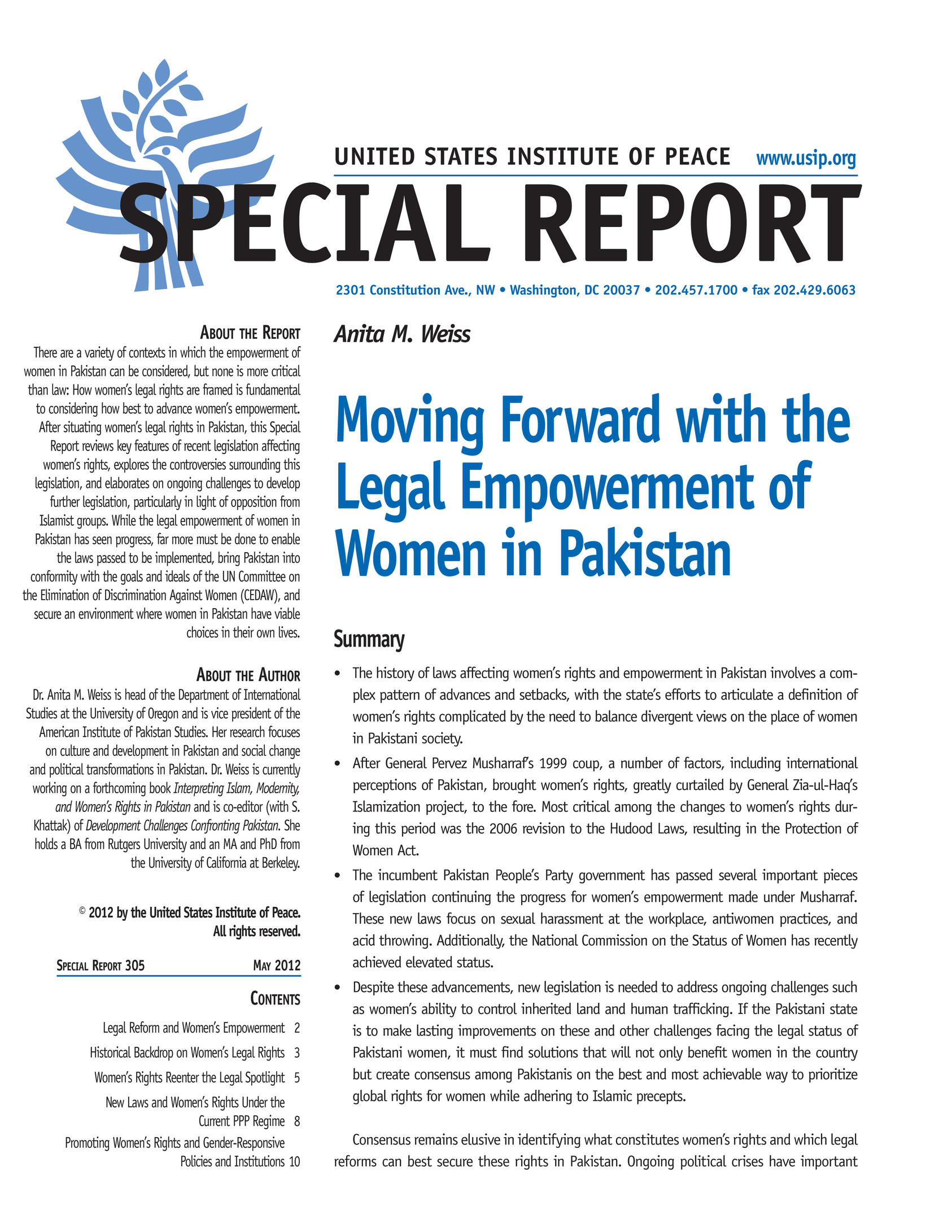There are a variety of contexts in which the empowerment of women in Pakistan can be considered, but none is more critical than law: How women’s legal rights are framed is fundamental to considering how best to advance women’s empowerment. After situating women’s legal rights in Pakistan, this Special Report reviews key features of recent legislation affecting women’s rights, explores the controversies surrounding this legislation, and elaborates on ongoing challenges to develop further legislation, particularly in light of opposition from Islamist groups.

Summary
- The history of laws affecting women’s rights and empowerment in Pakistan involves a complex pattern of advances and setbacks, with the state’s efforts to articulate a definition of women’s rights complicated by the need to balance divergent views on the place of women in Pakistani society.
- After General Pervez Musharraf’s 1999 coup, a number of factors, including international perceptions of Pakistan, brought women’s rights, greatly curtailed by General Zia-ul-Haq’s Islamization project, to the fore. Most critical among the changes to women’s rights during this period was the 2006 revision to the Hudood Laws, resulting in the Protection of Women Act.
- The incumbent Pakistan People’s Party government has passed several important pieces of legislation continuing the progress for women’s empowerment made under Musharraf. These new laws focus on sexual harassment at the workplace, antiwomen practices, and acid throwing. Additionally, the National Commission on the Status of Women has recently achieved elevated status.
- Despite these advancements, new legislation is needed to address ongoing challenges such as women’s ability to control inherited land and human trafficking. If the Pakistani state is to make lasting improvements on these and other challenges facing the legal status of Pakistani women, it must find solutions that will not only benefit women in the country but create consensus among Pakistanis on the best and most achievable way to prioritize global rights for women while adhering to Islamic precepts.
About the Report
There are a variety of contexts in which the empowerment of women in Pakistan can be considered, but none is more critical than law: How women’s legal rights are framed is fundamental to considering how best to advance women’s empowerment. After situating women’s legal rights in Pakistan, this Special Report reviews key features of recent legislation affecting women’s rights, explores the controversies surrounding this legislation, and elaborates on ongoing challenges to develop further legislation, particularly in light of opposition from Islamist groups. While the legal empowerment of women in Pakistan has seen progress, far more must be done to enable the laws passed to be implemented, bring Pakistan into conformity with the goals and ideals of the UN Committee on the Elimination of Discrimination Against Women (CEDAW), and secure an environment where women in Pakistan have viable choices in their own lives.
About the Author
Dr. Anita M. Weiss is head of the Department of International Studies at the University of Oregon and is vice president of the American Institute of Pakistan Studies. Her research focuses on culture and development in Pakistan and social change and political transformations in Pakistan. Dr. Weiss is currently working on a forthcoming book Interpreting Islam, Modernity, and Women’s Rights in Pakistan and is co-editor (with S. Khattak) of Development Challenges Confronting Pakistan. She holds a BA from Rutgers University and an MA and PhD from the University of California at Berkeley.